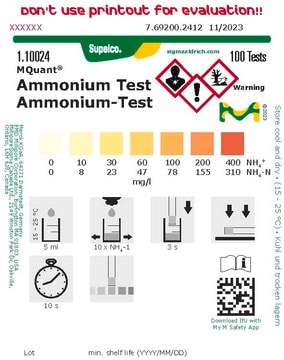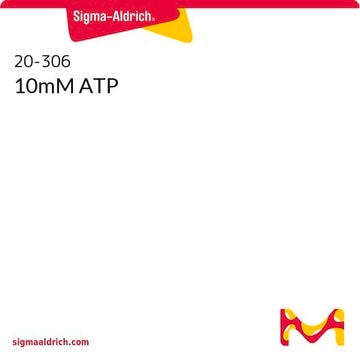12-533
GSM (GSK3 substrate peptide)
Synonym(s):
GSK3 Substrate Peptide, GSM Peptide, Substrate for GSK3
Sign Into View Organizational & Contract Pricing
All Photos(1)
About This Item
UNSPSC Code:
12352200
eCl@ss:
32160405
NACRES:
NA.41
Recommended Products
mol wt
Mw 2673 Da
Quality Level
manufacturer/tradename
Upstate®
technique(s)
activity assay: suitable (kinase)
NCBI accession no.
UniProt accession no.
shipped in
dry ice
Application
GSM (GSK3 substrate peptide) has been used:
- in in vitro glycogen synthase kinase 3 (GSK-3)-3β activity assay to measure the kinase activity of GSK-3
- as a supplement in perfusates in kinase activity assay to determine the effect of the phosphatase-activating domain (PAD) peptide on squid axoplasm
- as a control in Kinase-Glo luminescent kinase assay to measure the influence of ibuprofen treatment on the catalytic activity of the kinase GSK3β
Biochem/physiol Actions
Glycogen synthase kinase 3 (GSK3) is a protein kinase, which regulates glycogen metabolism. It regulates various cell functions, like signaling by insulin, growth factors and nutrients, and the specification of cell fates during embryonic development. GSK3 is involved modulating in apoptosis, cell division, and microtubule function.
Quality
Routinely evaluated as a substrate for GSK3β (Catalog # 14-306).
Physical form
1 mg of GSM lyophilized from 1 mL sterile, distilled water. Lyophilized powder.
Storage and Stability
Lyophilized: 2 years at -20°C. Rehydrated: 6 months at -20°C
Legal Information
UPSTATE is a registered trademark of Merck KGaA, Darmstadt, Germany
Disclaimer
Unless otherwise stated in our catalog or other company documentation accompanying the product(s), our products are intended for research use only and are not to be used for any other purpose, which includes but is not limited to, unauthorized commercial uses, in vitro diagnostic uses, ex vivo or in vivo therapeutic uses or any type of consumption or application to humans or animals.
Storage Class Code
11 - Combustible Solids
WGK
WGK 1
Flash Point(F)
Not applicable
Flash Point(C)
Not applicable
Certificates of Analysis (COA)
Search for Certificates of Analysis (COA) by entering the products Lot/Batch Number. Lot and Batch Numbers can be found on a product’s label following the words ‘Lot’ or ‘Batch’.
Already Own This Product?
Find documentation for the products that you have recently purchased in the Document Library.
Nydia Tejeda-Muñoz et al.
Molecular and cellular biology, 36(5), 731-741 (2015-12-30)
The molecular events that drive Wnt-induced regulation of glycogen synthase kinase 3β (GSK-3β) activity are poorly defined. In this study, we found that protein kinase Cζ (PKCζ) and GSK-3β interact mainly in colon cancer cells. Wnt stimulation induced a rapid
Vânia Gonçalves et al.
Oncotarget, 11(47), 4421-4437 (2020-12-15)
A major risk factor promoting tumor development is chronic inflammation and the use of nonsteroidal anti-inflammatory drugs (NSAID), including ibuprofen, can decrease the risk of developing various types of cancer, including colorectal cancer (CRC). Although the molecular mechanism behind the
P Cohen et al.
Nature reviews. Molecular cell biology, 2(10), 769-776 (2001-10-05)
Glycogen synthase kinase 3 (GSK3) was initially described as a key enzyme involved in glycogen metabolism, but is now known to regulate a diverse array of cell functions. The study of the substrate specificity and regulation of GSK3 activity has
W Jonathan Ryves et al.
Biochemical and biophysical research communications, 290(3), 967-972 (2002-01-19)
Lithium inhibits (Li(+)) glycogen synthase kinase-3 (GSK-3) by competition for magnesium (Mg(2+)), but not ATP or substrate. Here, we show that the group II metal ion beryllium (Be(2+)) is a potent inhibitor of GSK-3 and competes for both Mg(2+) and
An assay for glycogen synthase kinase 3 (GSK-3) for use in crude cell extracts
Ryves, W. J., et al
Analytical biochemistry, 264, 124-127 (1998)
Our team of scientists has experience in all areas of research including Life Science, Material Science, Chemical Synthesis, Chromatography, Analytical and many others.
Contact Technical Service





